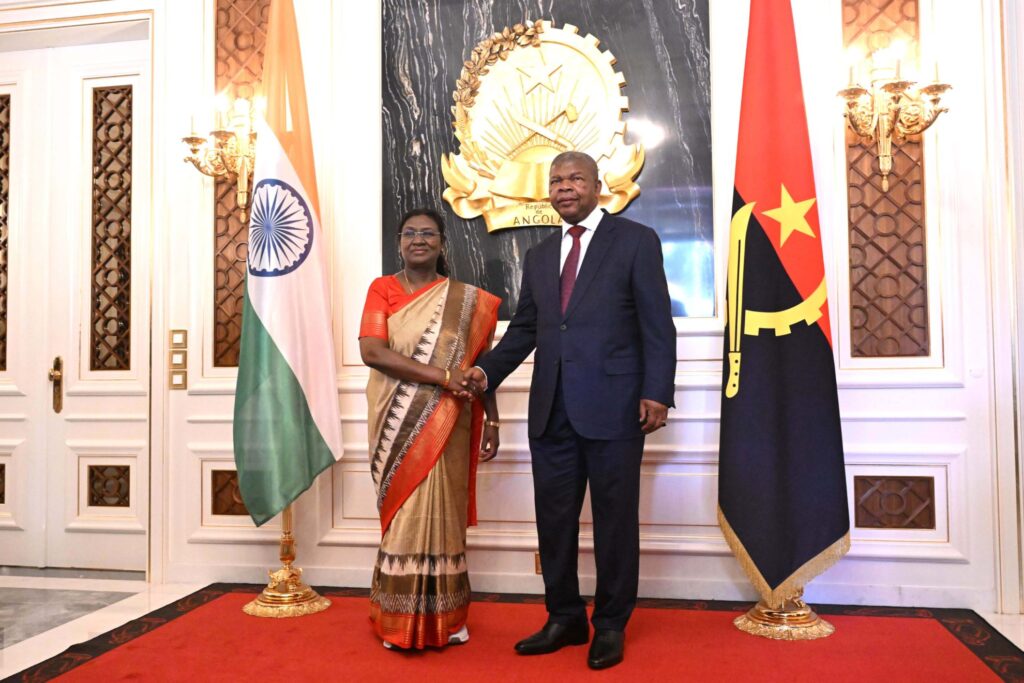Marking Angola’s Golden Jubilee of independence on November 11, the high-level visit of President Droupadi Murmu underscores the expanding and diversified partnerships between the two nations.

As Angola commemorates 50 years of independence and India and Angola celebrate 40 years of diplomatic relations in 2025, the two nations stand at a historic crossroads — their shared legacy of solidarity now maturing into a dynamic, multifaceted partnership for the 21st century.
India’s engagement with Angola has roots in the latter’s struggle for freedom from Portuguese colonial rule. New Delhi stood early in support of Angola’s liberation, and formal diplomatic ties were established in 1985. Over subsequent years, notably including the 1986 visit of Prime Minister Rajiv Gandhi to Luanda and the signing of a General-Cooperation Agreement, the foundation for enduring ties in trade, development and technical collaboration was laid.
Over time the relationship matured — anchored in shared values of South-South cooperation and anti-colonial solidarity. Angola emerged as a key partner for India in Africa, especially in the energy sector, as one of India’s major suppliers of crude oil. But this story is now evolving: today the focus is on strategic diversification and capacity-building across sectors.
High-level visits have reinforced this shift. In May 2025, Angolan President João Manuel Gonçalves Lourenço made a landmark state visit to India — the first by an Angolan head of state in nearly four decades — to mark the 40-year diplomatic milestone. During his visit, a number of MoUs were signed across agriculture, traditional medicine (Ayurveda), cultural cooperation and defence. India also announced a USD 200 million line of credit to support Angola’s armed forces modernisation.
Currently, President of India, Droupadi Murmu is visiting Luanda to attend Angola’s independence celebrations and will address the National Assembly, further cementing bilateral momentum. Ministry of External Affairs (MEA) spokesperson Randhir Jaiswal has said that the visit comes as India and Angola celebrate 40 years of diplomatic relations and will further strengthen bilateral cooperation. He added that the visit will “deepen engagement across trade, energy, and development sectors.”
Rao Narender Yadav, Director of the African Centre of India, offers a grounded perspective on the deepening India–Angola partnership: “India’s engagement with Angola reflects a mature and people-centred partnership — one that goes beyond trade and energy to include defence, agriculture, digital technology, health, and renewable energy. Over the past few years, India has extended more than USD 200 million in concessional credit, supported capacity-building programmes through ITEC and ICCR scholarships, and welcomed Angola into the International Solar Alliance. These initiatives show how our ties are evolving from transactional exchanges to a long-term developmental partnership rooted in mutual respect, shared growth, and historical solidarity.”
The new areas of cooperation between India and Angola highlight the growing depth and diversification of their partnership. In agriculture, health, and traditional medicine, recent MoUs on irrigation, agri-mechanisation, pharmaceuticals, and Ayurveda reflect a people-focused approach to growth. The partnership is also expanding into renewable energy and critical minerals, marked by Angola joining the International Solar Alliance (ISA) and exploring cooperation in rare earth elements for sustainable development.
Equally, people-to-people and cultural exchanges remain central to the relationship. With about 8,000 Indians living in Angola and active cultural and youth programmes, the human connection continues to strengthen this evolving and future-oriented partnership.
As the two nations mark these anniversaries — 50 years of Angolan independence, 40 years of diplomatic friendship with India — they are clearly looking ahead to a future built on trust, shared aspirations and mutual opportunity. What began as a bond of solidarity has now evolved into a comprehensive partnership—spanning energy, technology, defence and sustainable development.
Together, India and Angola are scripting a modern narrative: one of two resilient nations, once under colonial shadows, now working hand-in-hand to shape a future of shared progress, responsibility and Southern leadership.